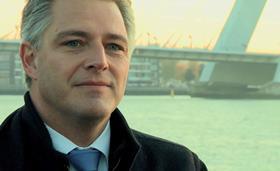
Terminal operators must find ways to work more closely together so that the overall service level provided to shippers, who increasingly want to piece together more efficient supply chains by connecting services offered by different providers, remains high.
Speaking at the Cool Logistics Global conference in Rotterdam, the city port’s director of containers, breakbulk and logistics, Emile Hoogsteden, said greater collaboration was something the port authorities were working hard to foster and something in which many operators themselves could see potential benefits.
“Increasingly, we’re seeing a lot of exchange of goods between shippers, so we need to have highly efficient, safe, secure, reliable port logistics to manage that exchange,” he explained. “In Rotterdam, we are working with the terminal operators to ensure that doing business in the port is easy as possible.”
The Netherlands’ largest port remains a highly important trading hub for fresh produce imported from around the world, including grapes, citrus and apples as the most important products in terms of volume.
While South Africa, Brazil and Costa Rica lead the way as the largest sources of fresh produce entering Europe via Rotterdam, over the past year the strongest growth in the fruit category has been noted in South Africa and Peru.
The total volume of containerised fruit shipments passing through the port last year was 3.9m tonnes, up 2.6 per cent from 3.8m tonnes in 2012.
“When the two new terminals at Maasvlakte open up we will see five terminals. We are working on a system where we connect all the terminals in the Maasvlakte area so it can be treated as one terminal,” Hoogsteden revealed.
“We want to use more barges for this and so we are working to develop barge services connecting the Maasvlakte terminals with coldstores further inland,” he added. There is huge competition between the terminals, of course, but we all understand that we have to bring up the level first and then compete.”



